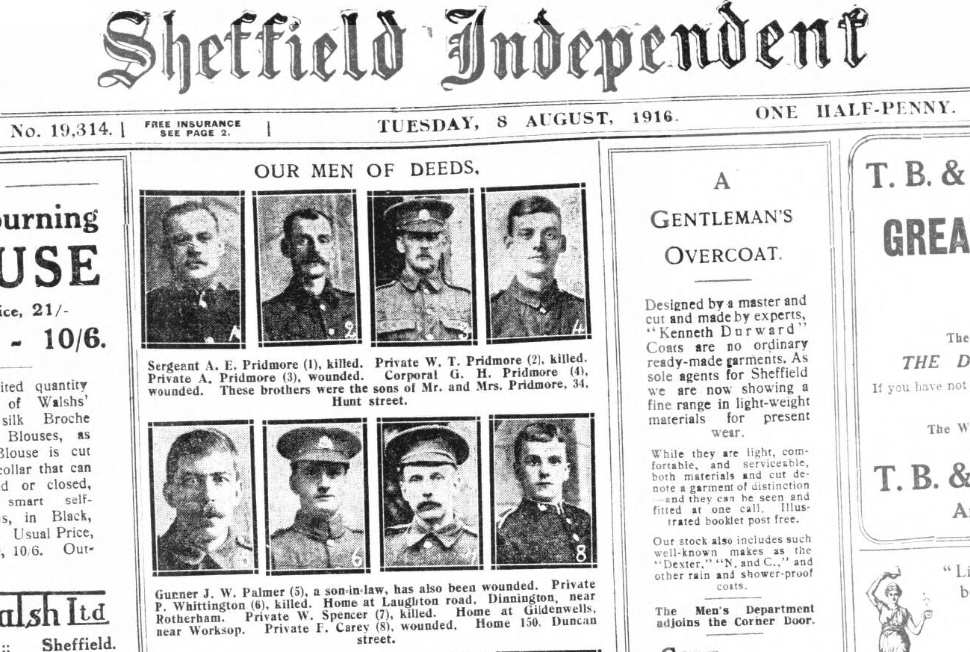Remembrance Day was last week, but courtesy of the newspaper archive on genesreunited.com, let's take a moment to remember 1916, when the Pridmore family made the front page of the Sheffield Independent. As described at length in my blog post five years ago, Arthur and John Pridmore had died at Ypres in 1914, and their brothers Albert and George Harry, as well as their sister Florence's husband John/James Palmer had all been wounded in action. Albert subsequently died in 1917, and George Harry in 1918. It's nice to see photos of them, but the caption gets John's initials wrong - the father was William Thomas, the soldier was John Thomas.
Albert's son, also called Albert, had died the previous year. Rather lost among the war news, he got two short paragraphs in the Sheffield Daily Independent, Tuesday 12 October 1915. His name and age are both wrong.
At the Great Central Goods Yard, Sheffield, last night, Arthur Pridmore (17) of Brownell street, employed at the yard, was found lying on the lines where an engine had recently passed. His left leg had been completely severed below the knee, and he had sustained severe injury to his head.
He was taken to the Royal Infirmary in the Fire Brigade Ambulance, and Dr. Cobb pronounced life extinct. The body was afterwards removed to the Public Mortuary.
Two days later, the newspaper reports the coroner's inquest.
RAILWAY DANGERS
Coroner's Jury & Young Boys on Night Work.
SHEFFIELD FATALITY
The question as to the employment on night work of young boys was raised at an inquest held in Sheffield yesterday on the body of Albert Pridmore (14) of Brownell street, a wagon greaser employed by the Great Central Railway Co., who was killed at the Bridgehouses Goods Station of the company on Monday night.
The evidence showed that Monday night was the youth's second on night work. He had finished one job on a goods train, and had then to go to a cabin to fill his grease box ready to grease another train. His body was found in the six-foot way, one foot being completely severed and in the four-foot way. He was apparently run over either by a train or a light engine. No one witnessed the accident.
A boy who was working with Pridmore, George Bingley, aged 15, said they had finished greasing the train with the exception of one new wagon. An examiner warned them not to go between wagons, but to go round a light engine at the back of the train.
Discovery of the Body.
Witness showed Pridmore how to grease the new wagon, and then, making sure that the train was not about to move, went underneath the wagon while Pridmore was walking around the end of the train. Witness went underneath the wagon because the time was approaching for the train to depart, and the work had to be done. He himself warned Pridmore to go round the train and not between the wagons.
When witness finished greasing the wagon the train started, and looking up he saw a light flicker near the rear of the train. He took no particular notice of this at first, but when he found that his mate had not been to the cabin for grease he went to look if anything had happened, and found the body in the six-foot way. It must have been the deceased's hand lamp which flickered.
Lack of Experience.
Another witness said he did not think the boy had sufficient experience to do the work on nights.
The Coroner said the boy Bingley had admitted having broken the rules by passing underneath the wagons of the train. He (the Coroner), however, was not going to blame him. He thought the boy's explanation was a perfectly satisfactory one. He agreed that the deceased had not had sufficient experience, but he was not satisfied that he was following the other's example. As to the employment on nights of such young lads, the jury knew that we were not living in ordinary times, and that everybody was short of labour.
The jury returned a verdict of accidental death, stating that there was no evidence to show whether the boy was run over by the loaded train or light engine, further adding that they thought that young boys who were engaged on the railway at night time, having finished their work, should be escorted back to the cabin by the men under whom they were working.
The world really has come a long way in the last hundred years, hasn't it?
The world really has come a long way in the last hundred years, hasn't it?

No comments:
Post a Comment